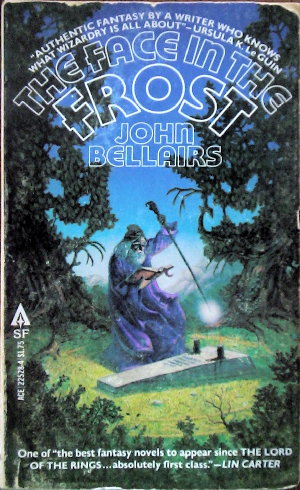 Short stories may be the ultimate way to experience horror fiction.
Short stories may be the ultimate way to experience horror fiction.
Think about it. You typically consume a short story in one sitting, no breaks, no relief from the mounting tension and dread. If the tale’s a gripper, you don’t dare come up for air. But with a novel — even one you really like — the experience is spread out, sometimes over a couple of weeks. And each time you put down the book, the tension dissipates.
Not surprisingly, virtually every major horror writer, from Edgar Allan Poe to Laird Barron, has written in short form. Pieces such as Ray Bradbury’s “The Next in Line,” Stephen King’s “I am the Doorway” and H.P. Lovecraft’s “Call of Cthulhu” all come to mind as my own early sources of chills — and writing inspiration.
With Halloween right around the corner, I asked other authors and editors to talk about the short stories that terrified them the most. The resulting selections make a great late-October reading list.
___________________________________
Lisa Tuttle: Lisa Tuttle is an American-born science fiction, fantasy and horror author who currently resides in the United Kingdom. She has published more than a dozen novels, seven short story collections and several non-fiction titles. She won the John W. Campbell Award for Best New Writer, the BSFA Award for Short Fiction and the Nebula Award for Best Short Story (which she refused).
The first thing I thought of when asked for the scariest short story I’d ever read was “The Fog Horn” by Gertrude Atherton. But then I realized no one under the age of 50 would truly appreciate just why it is so terrifying. So, to balance that out, I must add another. This one scared the socks off me when I first read it, aged about twelve, and it holds up very well today. I love ghost stories, but really, when you think about it, ghosts are not that scary, being unable to do very much. But there are exceptions, like “The Gentleman from Down Under” by L.P. Hartley.
___________________________________
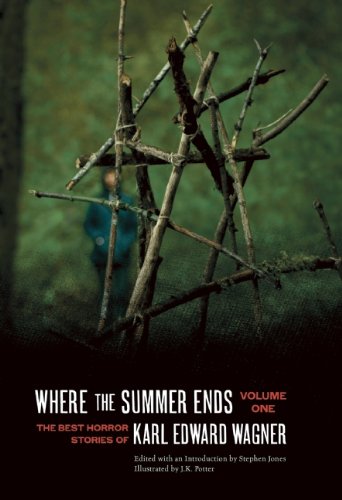 Joe McKinney: Joe McKinney, a two-time winner of the Bram Stoker Award, is an author in many genres, including horror, zombie apocalypse tales, ghost stories, virus thrillers, crime and science fiction. He has written 17 novels, developed two collections of short stories, created a tale for a comic book, and been both published in and edited numerous anthologies.
Joe McKinney: Joe McKinney, a two-time winner of the Bram Stoker Award, is an author in many genres, including horror, zombie apocalypse tales, ghost stories, virus thrillers, crime and science fiction. He has written 17 novels, developed two collections of short stories, created a tale for a comic book, and been both published in and edited numerous anthologies.
Horror, if we’re being honest with ourselves, lives in the short story. That’s where the genre truly excels, and that’s why EVERY SINGLE MASTER OF HORROR has written in the short story genre. Yes, there are masterpieces in the novel genre. I grant you that. But the truly defining moments of horror’s graduation from fringe hack work to beloved cultural groupspeak come from the short story. So, if I had to pick just one, I’d give the nod to “Sticks” by Karl Edward Wagner. I first encountered that story in an anthology I picked up in a used bookstore. At this point, I don’t have any chance of remembering the name of the anthology, but I absolutely remember the terror that went through me as I read that story for the first time. It was not only a brilliant character study, but a master class in developing the slow, creeping dread that makes horror so effective. It was only later, after I’d begun my own journey through professional publishing, that I realized that the story was also a thorough commentary — indeed, almost a satire — of the horror genre as it came of age in the ’70s and ’80s.
___________________________________
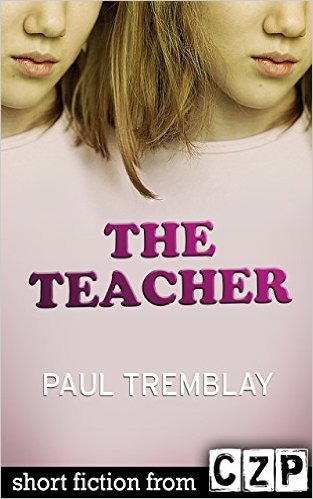 Nate Southard: Nate Southard is the author of Down, Pale Horses, Just Like Hell and several others. His latest collection, Will the Sun Ever Come Out Again?, is available now from Broken River Books. His work has appeared in such venues as Cemetery Dance, Black Static and Thuglit. A finalist for the Bram Stoker Award for Superior Achievement in Short Fiction, Nate lives in Austin, Texas.
Nate Southard: Nate Southard is the author of Down, Pale Horses, Just Like Hell and several others. His latest collection, Will the Sun Ever Come Out Again?, is available now from Broken River Books. His work has appeared in such venues as Cemetery Dance, Black Static and Thuglit. A finalist for the Bram Stoker Award for Superior Achievement in Short Fiction, Nate lives in Austin, Texas.
The story that sticks with me the most is Paul Tremblay’s “The Teacher.” A new teacher accepts eight kids into a special class, one that involves a horrible video and an even worse lesson. While not what most might consider a “scary” story, “The Teacher” is the kind of tale that worms its way deep and infects you. Once I finished it, I couldn’t read again for a few days. The entire world felt wrong.
___________________________________
Jeffrey Ford: Jeffrey Ford is an American writer whose works span genres including fantasy, sf and mystery. His stories and novels have been nominated multiple times for the World Fantasy Award, the Hugo Award, the Nebula Award, the Theodore Sturgeon Award, the International Horror Guild Award, the Fountain Award, Shirley Jackson Award and the Edgar Allan Poe Award. He’s a graduate of Binghamton University, where he studied with the novelist John Gardner.
I don’t scare easy when it comes to fiction. The most scared I’ve ever been reading a short story was when I was 10 and up late in my bed after everyone had gone to sleep. I read “The Phantom Rickshaw” by Rudyard Kipling. I’m not sure what it was about the piece that scared the shit out of me, maybe the inevitability of the young soldier’s death after he sees the forbidding form of the woman he jilted glide by in a rickshaw. It had to do with the quiet nature of the story — no outlandish haunting — just a silent exchange of glances between the living and the dead. Creepy. Kipling is one of the best short story writers. Borges considered him better than James Joyce and Henry James. His colonial lineage is hard to defend. I side with Salman Rushdie’s take on him — “Kipling, there is much that is hard to forgive, but more that is hard to forget.”
___________________________________
 Jessica Reisman: Jessica Reisman’s stories have appeared in numerous magazines and anthologies. Her first novel, The Z Radiant, published by Five-Star Speculative Fiction, is “thinking reader’s sci-fi.” She was a Michener Fellow in Fiction in graduate school.
Jessica Reisman: Jessica Reisman’s stories have appeared in numerous magazines and anthologies. Her first novel, The Z Radiant, published by Five-Star Speculative Fiction, is “thinking reader’s sci-fi.” She was a Michener Fellow in Fiction in graduate school.
I wanted to go with a Lisa Tuttle story that I heard her read at a World Fantasy Convention (“Closet Dreams, according to Lisa. — Ed.) , but I can’t for the life of me remember the title. So I’m going with Maureen McHugh’s “The Naturalist.” The reason explaining why is essentially the same, however: I find stories about human monsters — psychopaths and sociopaths — much more terrifying and chilling than stories about supernatural monsters. Beyond being possible, they actually exist and do horrifying, scary, scary things.
___________________________________
Gene O’Neill: Gene O’Neill is a multi-award nominated writer of science fiction, fantasy and horror fiction. More than 100 of his works have been published in venues including Cemetery Dance Magazine, Twilight Zone Magazine and the Magazine of Fantasy and Science Fiction.
I think it’s a tie between George R.R. Martin’s “The Pear-Shaped Man” and Michael Shea’s “The Autopsy.” Martin’s story is great because essentially you become what you hate and fear. Shea’s story is great because of a dying man’s revenge against a seemingly overwhelming force.
___________________________________
Tina Connolly: Tina Connolly is the author of the Ironskin trilogy from Tor Books, and the Seriously Wicked series, from Tor Teen. Ironskin, her first fantasy novel, was a Nebula finalist. Her stories have appeared in Women Destroy SF, Lightspeed, Tor.com, Strange Horizons, Beneath Ceaseless Skies and many more.
I don’t read a lot of horror, but I do remember loving to be scared stiff by the John Bellairs books as a kid. They were so deliciously gothic and atmospheric — and the creepy illustrations by Edward Gorey made them even better. The House with a Clock in the Walls is still my favorite, but the one that scared me the most was the terrifying sorcerer (who controls blizzards from inside his father’s tomb, IIRC) in the Dark Secret of Weatherend.
___________________________________
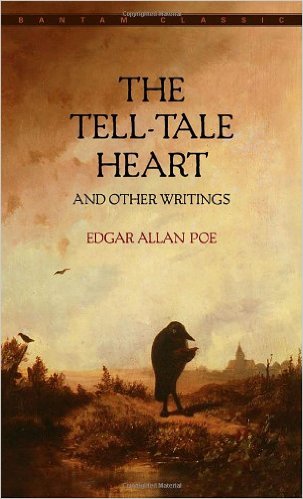
Lori Michelle: Lori Michelle is the co-owner/CFO/layout guru of Perpetual Motion Machine Publishing and the editor-in-chief of Dark Moon Digest and Dark Eclipse. She is the author of Dual Harvest and the editor of Bleed, an anthology where the proceeds will go to the National Children’s Cancer Society. Several of her stories have appeared in anthologies including the 2012 Bram Stoker finalist Slices of Flesh.
I am not sure if this is the scariest story I have ever read, but it is certainly the most memorable short story I have ever read. It is by the great Stephen King and appeared in Nightmares & Dreamscapes. I am talking about “The Moving Finger.” The images of a strange anomaly coming into your safe haven via the drains has given me shivers over the years. The bathroom is supposed to be the place where you can relax. But SK has shown that nowhere is safe, not even your own sink.
___________________________________
R.L. Ugolini: R.L. Ugolini’s short stories have appeared in literary journals and anthologies, including, most recently, Red Rock Review and Demonic Visions Vol. 3, 4 & 5. The Summerset Review nominated her story “Falllow” for the 2011 Million Writers’ Award. Samhain Publishing released her first novel Quakes in 2015.
It was 1843, and the world had yet to suffer the horrors (culturally, if not exactly psychologically) of sparkly vampires, Twitter or stuffed-crust pizza. An agitated narrator lays out his crime for his readers. He has done the unspeakable — he is a madman, a monster. And yet, as his story unfolds, it becomes clear the terror of the tale lies not with who he is or what he has done, but with how his conscience will bear his guilt. It is a reminder that horror need have no demons save those of our own making. For this reason, I recommend “The Tell-Tale Heart,” by Edgar Allan Poe.
___________________________________
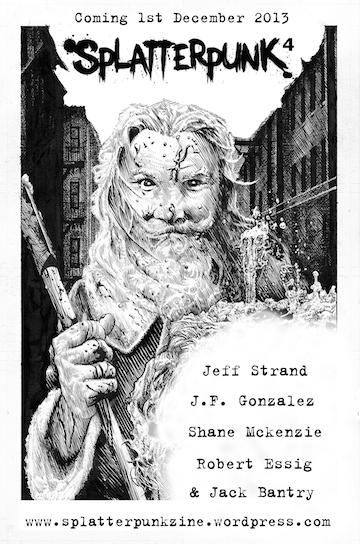 Max Booth III: Max Booth III is the author of three novels: Toxicity, The Mind is a Razorblade and How to Successfully Kidnap Strangers. He is the co-founder and editor-in-chief of Perpetual Motion Machine Publishing. He’s currently a columnist for LitReactor and Slush Pile Heroes. He has studied under Craig Clevenger and award-winning editor Jennifer Brozek.
Max Booth III: Max Booth III is the author of three novels: Toxicity, The Mind is a Razorblade and How to Successfully Kidnap Strangers. He is the co-founder and editor-in-chief of Perpetual Motion Machine Publishing. He’s currently a columnist for LitReactor and Slush Pile Heroes. He has studied under Craig Clevenger and award-winning editor Jennifer Brozek.
“I’m On My” by Shane McKenzie published in Splatterpunk Zine #4. A thousand stories popped in my head when Sanford asked me to pick the story that has scared me the most. Many classics, which I’m sure you already know about. However, there’s one short story that has really stuck with me since I first read it back in 2013. And that is Shane McKenzie’s “I’m On My.” It’s a short little tale about a man driving home to his family, only to encounter a slight detour. Look, when you’re driving, all it takes is for your attention to be distracted for a single second, and not only is your whole life ruined, but so are others’. “I’m On My” is a story about an innocent man accidentally running over a small child. There is nobody around that witnesses this crime. It’s just the man and the boy he’s hit. If you were in the same situation, how would you react? I think we all would like to say, “I’d call the police and wait with the boy!” But that’s just what we like to say. The truth is, there’s no way of knowing how we would react to such a situation unless it actually happens. It’s a heat-of-the-moment type of situation, and the implicated consequences of such an accident are absolutely terrifying. Every morning, I drive home from work and see various kids waiting for the school bus, and I swear, every morning I am reminded of “I’m On My.” This little story has fucked with me so much.
___________________________________
Jamie Lackey: Jamie Lackey write science fiction, fantasy and horror short stories. She read submissions for Clarkesworld Magazine from 2008 through 2013. She also worked as an assistant editor for the Triangulation Annual Anthology Series from 2008-2010, and she was one of the magazine’s two coeditors in 2011. She was an assistant editor at Electric Velocipede from 2012-2013 and is the editor of Triangulation: Lost Voices.
I have to go with “Ponies” by Kij Johnson. It’s just so delightfully dark wrapped in shininess. And the ending is tragic and inevitable.
___________________________________
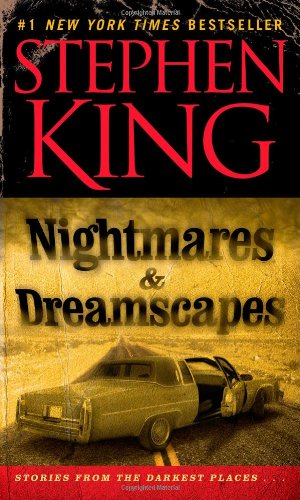 Eric J. Guignard: Eric J. Guignard writes dark and speculative fiction from the outskirts of Los Angeles. His stories and articles have appeared in Nightmare Magazine, Shock Totem, Buzzy Mag, Bewildering Stories and Stupefying Stories. He’s also an anthology editor, having published Dark Tales of Lost Civilizations and After Death…, the latter of which won the 2013 Bram Stoker Award.
Eric J. Guignard: Eric J. Guignard writes dark and speculative fiction from the outskirts of Los Angeles. His stories and articles have appeared in Nightmare Magazine, Shock Totem, Buzzy Mag, Bewildering Stories and Stupefying Stories. He’s also an anthology editor, having published Dark Tales of Lost Civilizations and After Death…, the latter of which won the 2013 Bram Stoker Award.
Being an indecisive writer, I considered equally two of the scariest stories I’ve ever read, though each for a different reason. “Other People” by Neil Gaiman (published first in Fragile Things: Short Fictions and Wonders, 2006) is one of the bleakest visions of Hell I’ve ever encountered. This scared me remarkably, because there’s a belief that Hell is different for all, and it is designed individually based upon your worst fears… I wouldn’t have feared this prior, but after reading the story, suddenly Gaiman’s tale embodied what I imagined the worst type of Hell to be, in which you relive out all the pain you’ve caused other people, whether directly or indirectly, over and over again… and now I can’t “unknow it.” My second is “Crouch End” by Stephen King (published first in New Tales of the Cthulhu Mythos, 1980; collected in Nightmares & Dreamscapes, 1993) I was probably about 18 or 19 years old when I read this story, and it freaked me out so much I swore I’d never read it again. And I haven’t… I don’t know if this story would still affect me so terribly now, but there were some passages that just haunted me at the time. I wasn’t familiar with the Cthulhu universe back then — which this story is homage to — so the descriptions of subtly-changing things around us and slithering shapes seen only from the corner of your eye were really quite seminal to me.

